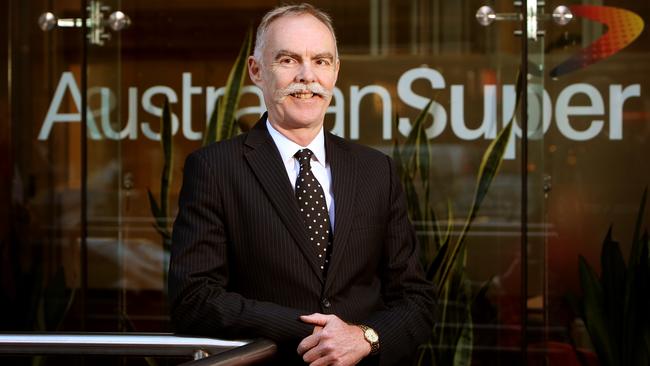‘Ideology gone mad’: Ian Silk slams superannuation veto laws
AustralianSuper boss Ian Silk has hit out at new laws that would give Treasurer Josh Frydenberg the power to block super fund investments.

New laws that would give Treasurer Josh Frydenberg the power to block super fund investments “smack of ideological fervour gone mad” and introduce “real concerns of sovereign risk”, according to the CEO of Australia’s largest super fund.
Ian Silk, who sits in the top job at the $200bn AustralianSuper, on Thursday warned of the risks posed by the Your Future, Your Super reforms, in particular, elements of a new best financial interests duty which he panned as “frankly bizarre and unjustified”.
This best financial interest bill, as part of the reform package, proposes to reverse the existing burden of proof in civil penalty prosecutions brought by the regulators, meaning the onus will be on the trustee to show it properly discharged its duties.
It will also bring in regulations allowing for certain payments or investments to be banned, even if they are in the best financial interests of members.
“The reversal of the onus of proof, the fact that there’s no materiality, that it does not apply to all funds, that the overt and express decision for the parliament to intrude on the decision-making process of super funds that already have significant regulatory oversight by virtue of a number of regulators — it’s impossible to conceive what the rationale for it is,” Mr Silk told a Senate economics legislation committee.
“There’s another dimension to this: it introduces for the first time into the $3 trillion Australian super system real concerns about sovereign risk,” he warned.
“Super funds are big investors, they make big investments often with joint venture partners and I would say an int org is going to think twice about partnering with an Australian investor in the knowledge that politicians might override a decision to enter into a contract that’s been made in good faith by a super fund on behalf of its members.”
No clear case had been made as to why the government was introducing a veto power, he said.
“The fact that it can be exercised against decisions that have been made in the best financial interests of members suggests that there’s an opportunity at least for a very capricious use of this power,” Mr Silk said.
Commenting on the proposed performance test part of the package, consultancy firm Mercer told the committee it would alter investment decision-making and see member returns take a hit.
“We believe the investment performance test, together with the proposed benchmarks, will inevitably impose a constraint on the investment decisions made by super fund trustees and their investment committees,” Mercer senior partner David Knox said.
“That is due to the significant consequences of failing the test. Trustees will limit the range of investments they’re prepared to consider due to the risk of deviating from the benchmark.”
Mercer expects the investment constraints to lead to lower long-term investment returns and poorer outcomes for members.
Dr Knox also warned on the difficulty of ensuring business would be ready for the changes by the July 1 start date, if the bill passes.
“The stapled fund approach will require employers to be involved in the onboarding process of every new employee. A 1 July start date is impractical for Australian employers, many of whom are not ready,” he said.
But ATO representatives played down the impact on employers, saying the new step requiring an employer to contact the tax office if a new employee didn’t want to be stapled to their super fund would take “just a few minutes”.
Treasury, meanwhile, has been engaging with business to assess the impact on employers.
“We have spoken with regulators, begun targeted consultation with employers in relation to their systems and processes … to understand and minimise any impact,” Lynn Kelly from Treasury’s retirement income policy division said.
One of the chief complaints from funds and industry associations was that regulations accompanying the bill have not yet been released.
Ms Kelly was unable to confirm when the regulations would be released and if there would be a consultation process, instead saying that both the timing of the release and any consultation was a matter for government.
Criticising the legislation, Australian Institute of Superannuation Trustees senior manager policy David Haynes said it was hollow and lacking in “significant and fundamental information that may or may not be included in regulations”.
“On the face of it, the bill only applies the annual performance assessment and underperformance measures to MySuper products – the products that already have the highest standards and the greatest disclosure.
“In contrast, choice products holding over 60 per cent of the assets in APRA-regulated funds may again escape scrutiny, as some subset of these may or may not be included in the as yet unreleased regulations,” he said.
Mr Haynes said AIST was also concerned the premature implementation of stapling would result in workers being stapled to underperforming funds.






To join the conversation, please log in. Don't have an account? Register
Join the conversation, you are commenting as Logout